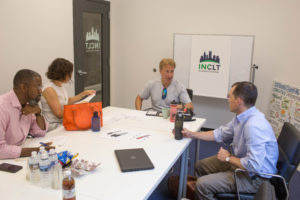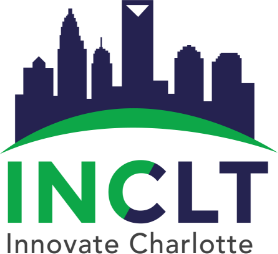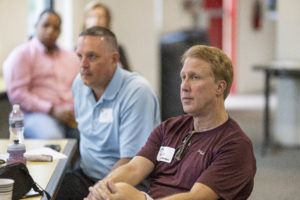A conversation with Keith Luedeman
Changes at Innovate Charlotte were formally announced last week, including Walt Frye stepping down to pursue other interests and passions around entrepreneurship. Keith Luedeman, a local entrepreneur and contributor to StartCharlotte, has agreed to volunteer as the interim leader of Innovate Charlotte as the organization evolves during this next stage. We caught up with Keith for a short interview to provide some answers about the transition at Innovate Charlotte and the path forward.
Keith, why did you decide to become the interim lead at Innovate Charlotte?
Because I believe in the mission: supporting the Charlotte entrepreneurial ecosystem. I’m at a unique time in my life where I have time to contribute as a volunteer, and this is one of my passions. This role at Innovate Charlotte/CRFE seemed like a natural fit, and there was a need.
Over the past year, the groundwork has been laid by inClt with the MIT VMS Mentoring program launch, the EO Accelerator founding, revamp of the website and pilot fundraising project with StartCharlotte. With Walt Frye moving on, I agreed to step in to make sure that the organization would be able to bridge from this first phase of its existence to its next phase with renewed city support. There is a lot more to do, and I thought it made sense to continue and evolve this organization as opposed to a de novo new organization at some undefined point in the future. Charlotte has a lot of raw materials to continue our growth as a great city in which to start a business.
Can you share with us how you and other stakeholders reached this decision?
I’ve had a long history with CRFE, the precursor organization to Innovate Charlotte. I was an original member of the board when it formed back in 2012. I was on the board until 2015, when I rolled off because of some other obligations associated with the sale of my startup, goodmortgage.com. I rolled back onto the board a couple of months ago as I saw the potential of what inClt could help accomplish.

As we were looking at a new direction for the organization, we felt having more entrepreneurs involved would benefit the cause. We looked around for who could step up in this interim role and who had familiarity with this position, and because most entrepreneurs are heads down in their business, that made it a pretty short list. Since I was free after a recent exit, I had the time, the passion, ability to volunteer and the familiarity with the organization.
What is going to change about Innovate Charlotte and its mission with you stepping in?
The good news I have is that we now have the city’s support for the next three years in the form of seed funding. We are going to continue building out the MIT Venture Mentorship Program and the EO Accelerator. We are looking at including other pillars and initiatives under inClt, but we’re not quite ready to announce those yet.
At the same time, Innovate Charlotte is currently in transition, so the mission and the vision for this organization are going to be refined in the next couple of months based on input from all relevant stakeholders in the community. The more we can involve entrepreneurs and entrepreneur support organizations in the leadership of the ecosystem, the better for all. We expect disagreements and lively conversation, but the key is, we will have conversations. Communication is key and has been noted as an area where we all can get better.
As I mentioned, we have an organization that is seed-funded by the city. On the other hand, we also need to provide a relevant value proposition to corporate and individual donors who want to support the startup ecosystem financially. What I would like to see happen is for Innovate Charlotte to have funds to advance its mission, and also to have an advisory board of entrepreneurs who are going to help decide on the best way to distribute these funds in a transparent way. That’s good for the city and its growth.
What are the major challenges you see yourself facing in the near future?
Nurturing an ecosystem is challenging. And it’s nurturing; it’s not anything you can order up and control. If you look at other cities and what they’ve done, the models are mostly different: They depend on the players and the funding sources. And it is up to all of us to find out what’s going to work for Charlotte. It’s a special place with special people, and we need to play to those strengths.
During the last six months of meeting a ton of players in the ecosystem, I’ve heard some common complaints. A lot of groups are heads down doing great things, and perhaps not aware of what other players are doing. That leads folks to think we are fragmented and uncoordinated, when in fact we’re just lacking some communication. There is a fair number of bridges that need to be built. Given the amount of healthy skepticism in the startup community, this is probably the biggest short-term challenge. Unless we show better coordination to donors, raising funds will continue to remain an issue in the foreseeable future. They are not necessarily used to the chaos that is a startup, and we need to show what we can accomplish in their terms if we want their support.
What gets you excited about the future?
I’ve spent the last six months meeting a lot of players in the startup space in Charlotte. I am very enthused about the possibilities of what’s going on. It is so much better than it was three years ago. It’s tremendously better than it was 10 years ago. I want to build on that.
I’m a glass-half-full kind of guy, and it will be hard to convince me that we can’t win in this race.
There has been a lot of great news: Time magazine and Yelp recently named Charlotte the top up-and-coming city. Our percentage growth with tech talent has been absolutely enormous. Does it mean we are perfect or great? Not yet; there is still a lot of work to be done. We need to be a city where you have the resources and support to become a startup, with nurturing across all the steps along the way all the way through exit — and then re-engaging as an investor and mentor.
When startups grow, you create jobs. And to keep growing the city’s economic base, we need these high-paying jobs to keep the new folks moving to town each day here, and to create mobility opportunities for all Charlotte citizens.
There are a ton of groups out there who are doing a fantastic job, and our job is to absolutely support them.
What help and resources do you need to accomplish this?
I need communication and an opportunity to hear the needs of the folks doing the day-to-day work. From the top, I am reaching out to mentorship programs in other cities to learn best practices. I’m reaching out to state organizations that support entrepreneurship. I am having meetings with people who are potential sources of funds to support the mission. The willingness to have a conversation is going to be important. We need to create more opportunities for people to invest in startups here, and then create wealth.
The studies and research inClt has done so far got us to where we are today: The city decided to fund us. Now we need to bring it to the next level in terms of better understanding of what various ecosystem players are doing, planning to do, how they collaborate and what would it take for them to get to the next level. Because we want to help, we are going to be asking a lot of questions.
Charlotte has had a great tradition of being an entrepreneurial city. Consider the Belks, the Levines with the Family Dollar, Hugh McColl with NationsBank, Ed Crutchfield with First Union and so on. Today we have success stories with AvidExchange, LendingTree, Peak10/Flexential and Red Ventures (and more). Some people look at these companies and say, “they aren’t startups; they’re too big.” We should never forget that, at some point in time, they were startups, and Charlotte nurtured and supported them. This is what we need to do for the next generation of entrepreneurs. After all, don’t we want more big company success stories, too?
If we are successful and able to channel funds to organizations to amplify the great work they are already doing, we can help the ecosystem as a whole.
It takes a village, and I think we have some very cool folks working in our village of Charlotte.

